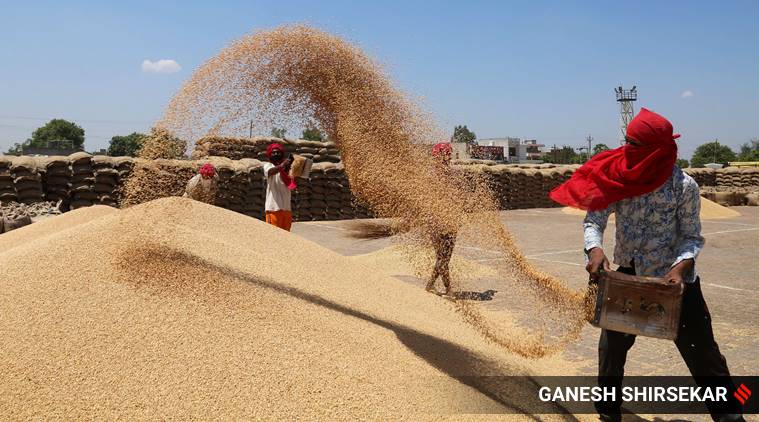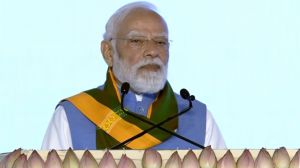Madhya Pradesh has emerged as only the second state in the country to procure more than 100 lakh metric tonnes (LMT) of wheat, and is set to surpass Punjab to become the largest wheat-procuring state for the central pool during the 2020-21 Rabi marketing season.
Data available with the Food Corporation of India (FCI) shows that as of June 6, Madhya Pradesh has procured 125.59 LMT wheat — 98.62 per cent of the total arrival of 127.34 LMT wheat in the state.

MP’s current wheat procurement figure is just below that of Punjab’s 127.12 LMT — the biggest contributor to the central pool.
Story continues below this ad
However, MP may cross Punjab’s figure given that the latter ended its procurement May 31 and the process is still on in the former.
Initially, MP had a target of 100 LMT of wheat procurement during current rabi season but it was revised upward to 140 LMT.
While there is no official explanation for the unprecedented spike in MP’s wheat procurement, sources said one reason could be the lower participation of private players because of Covid lockdown restrictions.
“Usually, private players go to buy MP wheat, which is considered of better quality. But this year, the private participation has been less,” a source said.
Story continues below this ad
Last year, MP had procured 67.25 lakh tonnes of wheat, lower than the 10-year average of 71 LMT, whereas Punjab achieved an all-time high figure of 129.12 LMT.
While Punjab has produced surplus foodgrains for the country for decades, MP joined the league very recently. For instance, in 2007-08, MP had procured only 0.57 LMT wheat, while the figure was 67.81 LMT for Punjab and 33.5 LMT for Haryana.
Subsequently, MP’s procurement grew and in 2013-14, with 63.55 LMT, it surpassed Haryana’s 58.73 to become the second biggest contributor to the central pool.
It maintained the lead over Haryana for next two years until 2015-16. After that it kept procuring an average of 61 LMT wheat per year before crossing the notional psychological mark of 100 LMT in the current year.
Story continues below this ad
MP is a “decentralized procurement” state, where wheat is procured by state agencies and only surplus wheat stocks over and above the state’s requirement — under the Targeted Public Distribution System or National Food Security Act, 2013 and other welfare schemes — are taken over by FCI for dispatching to other consuming regions.
In 2010-11, Haryana and Punjab jointly contributed about 73.5 per cent to the central pool but their share has come down to 54 per cent in the current year. Meanwhile, MP’s contribution has increased to 33.98 per cent in 2020-21 from 15.71 per cent a decade ago.
The Union Ministry of Consumer Affairs, Food and Public Distribution has set a wheat procurement target of 407 LMT for the rabi season in 2020-21 against which 369.51 LMT has been procured until June 6 — around 96.39 per cent of the total arrival of 383.48 LMT.
During the last marketing season, 344.10 LMT wheat was procured – 93.74 per cent of the total arrival of 367.07 LMT till June 6, 2019. Until June 6, Haryana has procured 73.68 LMT wheat of the total arrival of 73.68 LMT while the figure for Uttar Pradesh stands at 26.50 LMT of the arrival of 34.31 LMT.

 MP’s current wheat procurement figure is just below that of Punjab’s 127.12 LMT — the biggest contributor to the central pool. (Representational)
MP’s current wheat procurement figure is just below that of Punjab’s 127.12 LMT — the biggest contributor to the central pool. (Representational)






